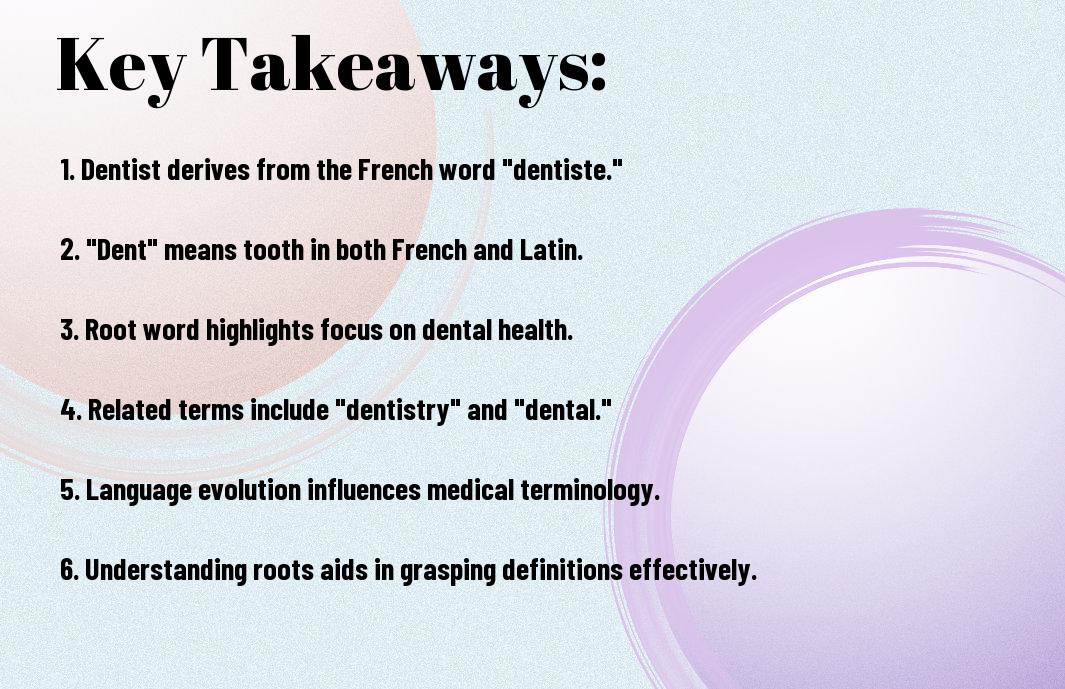Just like many professions, the title ‘dentist’ has interesting origins that can enhance your understanding of the field. By examining the root word, you’ll find that ‘dentist’ comes from the Latin word ‘dens,’ meaning tooth. This highlights the fundamental focus of your dentist’s work—teeth and oral health. To dive deeper into the world of oral care, you can explore more about Dentistry and its history.
Key Takeaways:
- Root Word: The root word of ‘dentist’ is ‘dent’, which comes from the Latin word ‘dens’, meaning tooth.
- Prefix and Suffix: The term ‘dentist’ combines ‘dent’ with the suffix ‘-ist’, which refers to someone who practices or specializes in a field.
- Related Terms: Other words that share the root ‘dent’ include ‘dental’, ‘dentistry’, and ‘dentures’, all relating to teeth.
- Historical Context: The profession of dentistry has evolved, but the root meaning concerning teeth remains relevant.
- Language Influence: Understanding the root helps to comprehend related terms in both English and other languages influenced by Latin.


The Etymology of Dentist
While the term ‘dentist’ might seem straightforward today, its origins reveal a rich history tied to the art of dentistry. This word has evolved through various languages, reflecting changes in practice and understanding of dental care over the centuries. By exploring its etymology, you gain insight into how this profession has been perceived throughout time.
Latin Origins
After delving into the roots of ‘dentist’, you’ll find that it can be traced back to the Latin word ‘dens’, meaning ‘tooth’. This connection highlights the fundamental aspect of dentistry—the care and treatment of teeth. From its Latin root, the term laid the groundwork for the terms we use today.
The Influence of French
Before the term ‘dentist’ was widely adopted in English, it was influenced significantly by the French language, specifically the word ‘dentiste’. This borrowing illustrates the pivotal role that French culture and language played in shaping English medical terminology. You can see how this evolution helped solidify the profession’s identity.
Dentist, as derived from the French ‘dentiste’, signifies not just a tooth specialist but also embodies the advancements made in dental care. The French term itself stems from ‘dent’, which is linked back to the Latin ‘dens’. Thus, when you think of the word ‘dentist’, you’re not just considering a profession; you’re acknowledging a lineage of language that connects various cultures and the ongoing evolution of healthcare. This historical context enhances your understanding of the importance of dental professionals in society.
Breakdown of the Root Word
There’s a lot to unpack when exploring the root word of ‘dentist.’ The term ‘dentist’ is derived from the Latin word ‘dens,’ meaning tooth. Understanding this root helps you appreciate the fundamental connection between a dentist’s profession and their focus on dental care. By accessing the origin of the word, you can gain insight into what dentists do and their role in maintaining oral health.
Definition of ‘Dent’
Dent refers to a tooth or teeth, highlighting the primary focus of a dentist’s work. In dental terminology, it often signifies aspects related to oral health, such as dental procedures and treatments specific to teeth. Understanding this definition can enhance your knowledge of the field and the importance of dental care.
Morphological Structure
To analyze the morphological structure of ‘dentist,’ you can break it down into its components. The root ‘dent’ relates directly to teeth, while the suffix ‘-ist’ denotes a practitioner or specialist in a particular field. Together, these elements illustrate the role of dentists as specialists dedicated to the care and treatment of teeth.
Breakdown of the word ‘dentist’ aids in recognizing how the root and suffix complement each other. The root ‘dent’ establishes the connection to teeth, while ‘-ist’ signifies someone who practices a specific profession. This combination emphasizes the dedicated role of dentists in ensuring your dental health and providing treatments tailored to your needs. By understanding this structure, you can better appreciate the expertise and focus inherent in the field of dentistry.
Related Terms in Dentistry
Despite the variety of terms used in dentistry, each plays a significant role in your oral health. Understanding these terms can enhance your knowledge and communication with your dental care provider. For instance, if you want to explore a Dentist Definition & Meaning, it’s important to grasp related concepts that illuminate the field further.
Dental
The term “dental” pertains to anything associated with teeth and oral health. From dental hygiene practices to dental treatments, this word encompasses a wide range of activities and specialties that contribute to maintaining your overall oral wellness.
Denture
Behind the word “denture” lies a solution for those who have lost their natural teeth. This term refers to artificial replacements that can be complete or partial, designed to restore function and aesthetics.
To ensure you have a thorough understanding, dentures can be made from different materials, including acrylic and metal. They are customized to fit comfortably in your mouth and help improve your ability to chew and speak. Regular care and maintenance of dentures are necessary to prolong their lifespan and to keep your mouth healthy.
Historical Context of Dentistry
Unlike many modern professions, dentistry has deep historical roots. The practice of caring for teeth dates back thousands of years, highlighting humanity’s long-standing commitment to oral health. Initial dental practices evolved from basic home remedies and folk traditions to more recognized methods over time. Understanding this historical context enhances your appreciation for the evolution of dental care and its significance throughout the ages.
Ancient Civilizations
Around 5000 BC, the earliest evidence of dental practices emerged in ancient civilizations such as the Egyptians and Sumerians. They utilized rudimentary tools, including sharpened stones, and even had early forms of toothpaste made from natural substances. You might find it fascinating that these ancient cultures recognized dental issues, showcasing a commitment to oral health long before modern dentistry was established.
Evolution of Dental Practices
Around 2000 BC, dental practices began to evolve significantly, incorporating more sophisticated techniques. Early civilizations developed specialized tools for tooth extraction and began documenting their methods. You may be surprised to learn that the ancient Greeks and Romans laid the groundwork for future dental practices, introducing concepts that you may still see in today’s dentistry, such as the importance of oral hygiene and the distinction between medical and dental care.
Considering the significant transformations in dental practices over the centuries, you can see how innovations in tools and methods have shaped modern dentistry. The shift from basic extractions to advanced, preventive care illustrates a continuous journey towards improving oral health. This evolution reflects humanity’s growing understanding of dental diseases and the importance of regular dental visits, a concept that you now embrace for better health.
Modern Applications of the Term
After its evolution, the term ‘dentist’ reflects modern dentistry’s expanding scope. Today, dentists do more than just treat dental issues; they provide preventive care, cosmetic enhancements, and overall oral health education. You may find that advancements in technology have transformed their methods, enabling them to deliver effective treatments with greater precision. The role of a dentist has become integral in maintaining not just your oral health, but also your overall well-being.
Professional Titles
Beside the standard title of ‘dentist’, you may encounter various specialized designations reflecting advanced training. These include orthodontists, periodontists, and endodontists, each focusing on different aspects of oral health. Understanding these titles can help you make informed decisions about your dental care. When seeking treatment, it’s wise to choose a professional whose expertise aligns with your specific needs.
Common Misconceptions
Applications of the term ‘dentist’ often lead to common misconceptions. You might think that all dentists are the same, but their skills and specialties can vary significantly. Some people assume dentists only focus on cavities and cleanings, overlooking their involvement in complex procedures like root canals or cosmetic treatments. It’s vital for you to recognize the diverse roles that dentists play in oral healthcare.
Even within your knowledge of dental care, misconceptions persist. For instance, you may believe that visiting a dentist is only necessary when you have a problem. In reality, regular check-ups are vital for preventing issues and maintaining oral health. Moreover, some might think that all dentists perform the same tasks, while in fact, they have unique expertise in various fields. Educating yourself on these differences can enhance your overall dental experience and outcomes.
Linguistic Variations and Translations
Not all languages use the same root word for dentist, leading to fascinating variations. The term ‘dentist’ has linguistic roots that can differ significantly across cultures and languages. Understanding these variations can enhance your appreciation for the profession and how it is viewed in different societies, showcasing the universal importance of oral health care.
International Terms
One interesting aspect of dental terminology lies in its international variations. The word “dentist” is used in many languages with slight modifications. For example, in Spanish, it’s “dentista,” while in French, it’s “dentiste.” These variations often retain a connection to the root word “dent,” derived from Latin, highlighting a shared understanding of dental health.
Variations in Other Languages
To explore further, you’ll discover that dental terms vary even more across languages. In German, the term is “Zahnarzt,” literally meaning “tooth doctor,” showcasing local adaptations to the concept of dental care. Similarly, in Italian, “dentista” is derived from the same Latin root, but colloquially, you might hear “denti” referring to teeth, illustrating the language’s regional characteristics.
Terms for the profession also shed light on cultural nuances. For instance, in Mandarin Chinese, the term “牙医” (yáyī) translates to “tooth doctor,” reflecting a practical approach to the profession. This indicates not only the importance of dentistry but also how different cultures conceptualize the role of a dentist in maintaining oral health. Engaging with these variations broadens your understanding of how language influences perceptions of medical professions globally.
Summing up
Presently, you can discern that the root word of ‘dentist’ is derived from the Latin word ‘dens,’ meaning ‘tooth.’ This etymology highlights the profession’s focus on oral health and dental care. By understanding this connection, you appreciate the historical significance and foundational purpose of dental practitioners in maintaining your dental hygiene and overall well-being.
Q: What is the root word of dentist?
A: The root word of “dentist” is “dent,” which comes from the Latin word “dens,” meaning “tooth.” This root is found in various related terms such as “dental” and “dentistry,” all of which pertain to teeth and dental care.
Q: How is the root word ‘dent’ used in other terms?
A: The root “dent” is used in several terms associated with teeth and oral health. For example, “dental” relates to anything concerning teeth or dentistry, while “dentition” refers to the arrangement or condition of teeth in the mouth. Additionally, “dentist” specifically indicates a professional who practices in the field of dentistry, focusing on oral health and dental care.
Q: Are there any other languages that have a similar root for the word ‘dentist’?
A: Yes, many languages have similar roots related to dental terminology. For instance, in French, the word “dentiste” is derived from “dent,” reflecting the same Latin root “dens.” Similarly, in Spanish, “dentista” shares the same origin, indicating a profession focused on dental health, thus showcasing the universal connection to the root meaning across different languages.






